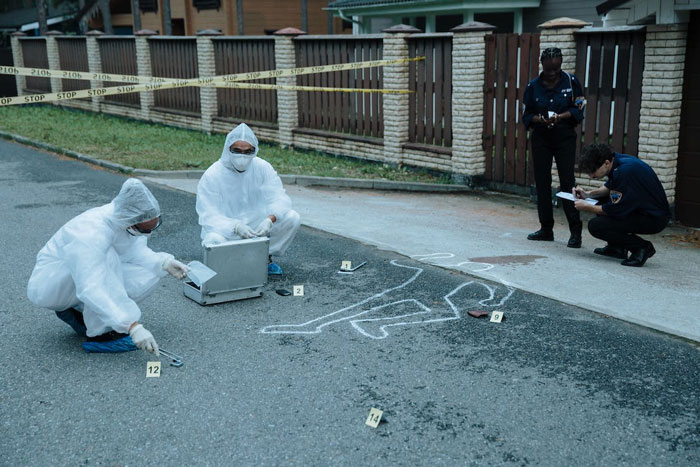
This post provides detailed information on the crime scene technician job description, including the key duties, tasks, and responsibilities they commonly perform.
It also highlights the major requirements you may be expected to meet to be hired for the crime scene technician role by most recruiters/employers.
What Does a Crime Scene Technician Do?
Crime scene technicians are highly trained professionals responsible for the application of scientific principles and advances in Forensic Science to analyze, identify, and classify mechanical devices, chemical and physical substances, materials, liquids, or other physical evidence to solve crime issues.
The crime scene technician job description involves collecting, packaging, and processing evidences from homicides, aggravated assaults, rapes, robberies, police involved shootings, and any other investigations that they are requested to assist field services or major crimes.
Crime scene technicians work in local and state government organizations, coroner’s offices, and crime labs, morgues, and police departments.
Their role requires them to report at a crime scene and help to examine, collect, and transport the physical evidence found there.
They take photos of a crime scene and help recreate the crime that took place, working alongside law enforcement.
They are responsible for identifying and processing physical evidence using various chemicals/processes, as well as thoroughly documenting crime scenes.
They perform chemical tests on suspects to determine gun firing when needed, and are responsible for operating a mobile crime scene lab.
The work description of crime scene technicians also entails compiling reports and maintaining and updating records for proper documentation.
It also involves property room controls, including the packaging, securing, and taking custody of all evidence collected and submitted for storage and processing.
The technicians are responsible for photographing and creating video tapes of crime scenes, persons, and properties.
Their duties include comparing and searching latent fingerprints manually and on AFIS computer system for classification, comparison, and identification.
They also enter/retrieve data from computer system to maintain database on wanted persons, and classify and search new records.
Crime scene technicians are required to apply independent judgment and discretion in the handling of emergency situations, determining and deciding upon procedures to be implemented, setting priorities, maintaining standards, and resolving problems.
They are responsible for providing guidance and training as required to lower level, interns, temporary employees, etc.
To work as a crime scene technician, a minimum of High School Diploma or GED and a combination of training and experience is acceptable, but an Associate Degree in forensic sciences, criminal justice, crime scene technology, or a related discipline is preferred.
You must also have a strong science background to perform the job successfully.
To be successful in your career, you need some other job role based soft skills such as attention to detail, strong analytical skills, active listening skills, communication skills, and critical thinking abilities.
Crime Scene Technician Job Description Example/Sample/Template
Crime scene technicians perform various functions, including collecting and preserving, and processing of physical evidence found at crime scenes to help resolve crime issues.
The role of the crime scene technician may vary depending on the crime scene.
Given below is a sample crime scene technician job description, consisting of major duties, tasks, and responsibilities commonly assigned to the position:
- Responsible for searching suspects’ fingerprints
- Lifts and collect fingerprints using powders and chemicals, as well as process and analyze fingerprints
- Responsible for collecting physical evidence, including bodily fluids and weapons
- Responsible for creating crime scene sketches
- Masters stamps records classified by other technicians, and reviews classifications for errors
- Communicates findings from the analysis of physical evidence
- Ensures to complete supplemental reports for action in each case
- Processes and stores submitted evidence
- Delivers DNA/Print evidence to appropriate laboratories by hand
- Generates disposition tracers, destruction orders, and pulls items for destruction
- Undertakes property room audits
- Gives courtroom testimony as an expert witness on fingerprint charts and evidence
- Provides DA’s Office consultations and autopsy attendance
- Receives, processes, and forward fingerprints cards of arrestees and applicants; and assists in maintaining departmental fingerprint file
- Responsible for evaluating reports from investigators’ manual and computer files
- Confers with investigators and prosecutors
- Assists in Instructing and training police and laboratory personnel in the use of fingerprint, photographic, and crime scene equipment and procedures.
Crime Scene Technician Requirements – Skills, Knowledge, and Abilities for a Successful Career
If you are seeking the job of a crime scene technician, employers will generally ask you to meet some requirements to prove that you will be able to perform the obligations, purpose, and objectives that characterize the role.
Shown below are major requirements you might be expected to fulfill to be considered for the crime scene technician position:
- Education: They require a minimum of High School Diploma or GED plus a combination of training and experience; but an Associate degree or vocational technical degree or specialized training that is equivalent to satisfactory completion of two (2) years of college education is preferred
- Certification: Crime Scene Technician Certification is preferred, or the ability to obtain it with one (1) year from date
- Knowledge: crime scene technicians must be knowledgeable of federal, state, and local laws as well as legal procedures. A military or law enforcement experience is an advantage
- It is essential that they possess knowledge of modern police identification techniques, police photography, human relations and local law enforcement practices, policies and procedures
- It is also required that they possess knowledge of proper methods of collecting, handling, and processing evidence. They must possess a strong scientific acumen and working knowledge of the various evidence-gathering chemicals and devices to work as a crime scene technician
- Communication skills: They require verbal and written communications abilities to communicate and interact with supervisors, elected officials, employees, members of the public, and all other significant groups involved in a case
- Technology skills: They should have advance knowledge in the use of scientific software, design software, photo imaging software, and databases
- Strong organizational skills: It is important that they are able to effectively manage time and prioritize assignments/tasks in performing their job
- Analytical skills: They must have the ability to survey a crime scene, and formulate theories on how the different pieces of evidence work together to unravel a crime and follow-up on key details
- Poise: It is essential that they have the ability to work in a variety of unpleasant and sometimes gruesome environments, such as the scene of a car crash, homicide or other assault that may involve a victim of any age. They must display poise under pressure and must be able to remain calm and focused on evidence-gathering, even while working around a horrific situation
- The ability to work independently: Crime scene technicians must be able to work without supervision and exercise independent judgment in handling issues
- Attention to detail: They must also pay meticulous attention to detail in analyzing and processing crime evidence
- Flexibility: They must be willing to work a rotating schedule, including evenings, weekends, and on-call hours
- Critical thinking and problem-solving abilities: They must have the ability to put together pieces of evidence and testimony to develop stories based on their interpretation of evidence in solving crime puzzles.
Conclusion
To hire a crime scene technician, recruiters need to publish the job description for interested individuals to respond to.
If you are an employer, to recruit for this position, you can adapt your job description from the detailed sample published in this post.
The detailed information provided on duties, skills, responsibilities, and requirements of a crime scene technician provided in this post can serve as a complete and thorough guide for employers recruiting for this position to attract and recruit the most resourceful candidates for the job.
This article is also useful to individuals desirous of a career as a crime scene technician to learn all they need to know about the duties and responsibilities of the job.












